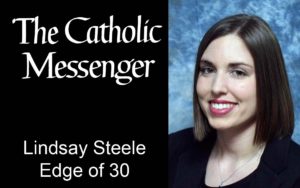By Lindsay Steele
A good friend of mine once offered an interesting perspective on the challenges of money management. “Most people live right at or just above their means regardless of how much or how little they make,” she suggested. “So no one ever really feels like they have enough money.”
 Is this statement true? I’m not sure, but it has stuck with me ever since.
Is this statement true? I’m not sure, but it has stuck with me ever since.
Here at The Catholic Messenger, I’ve been busy working on an article about money management as part of an upcoming series called “Hope for the Household.” Writing this article has caused me to stop and reflect on my own attitude toward money and how I choose to spend it.
While I didn’t consider myself fortunate at the time, I’m now grateful to have grown up in a family where money wasn’t something to be spent without a great deal of thought. My parents were of modest means, so we never had the best cars, toys, clothes or houses. Mom and Dad couldn’t show us love through gifts or expensive vacations so they showed us love in other ways, such as taking us camping or fishing. These low-cost experiences helped provide a memory-filled childhood and brought us closer as a family. But they did something else: they showed me that I don’t need a lot of money to be happy. My parents taught me to be a good steward of my resources, as God asks me to be.
My husband, Chris, grew up in a similar environment. As a couple, we’ve never really had to worry much about money. Some people may be surprised to hear this, as we, like our parents, are of modest means.
So what’s our trick? We live below our means and save the rest. Doing so allows Chris and me to continue working in the journalism field, which is emotionally fulfilling if not financially lucrative.
It also gives us a piece of mind, knowing we have something in the bank if we need it. We know that as a general rule we take in more than we spend without having to think about it. That allows us time to do more things that we enjoy.
Part of this is choosing to buy what we need, not what we want, especially when it comes to clothes, appliances and furniture. However, owning a home that cost well below what the bank was willing to lend us is probably our biggest money management strategy. Sure, it would have been cool to follow my dream and buy a well-restored, modernized Victorian home. But, we knew that we wanted to be able to have money in the bank for emergencies or domestic vacations (within reason). A more reasonable mortgage payment was a big step in making that possible. So we went for a practical choice: a two-bedroom, easy to maintain ranch house with a big basement that could be renovated if necessary.
I’m not saying I don’t struggle with money from time to time. I sometimes lament that I may never be able to tour Europe or visit Tokyo or swim along the Fijian beaches. I still get nervous when surprise expenses come up. Sometimes I wish I owned a large, new beautiful home like some other people I know. The commandment “Do not covet” comes to mind. Yeah, God gets it. It is always best to be grateful for what you have than to lament what you do not. I’m also fortunate that we haven’t had to deal with extended periods of unemployment or other emergencies which could potentially cause significant financial strain to the point in which careful money management is not enough.
I’m thankful my parents and Chris’ instilled in us the idea that you can be of modest means, spend money wisely and still be happy. There is a sense of peace and freedom in knowing that you don’t have to have the best of everything. It makes it so much easier to be grateful for what we have and to find joy in what is really important in life.
(Editor’s note: Lindsay Steele is a reporter for The Catholic Messenger. Contact her at steele@davenportdiocese.org or by phone at (563) 888-4248.)











